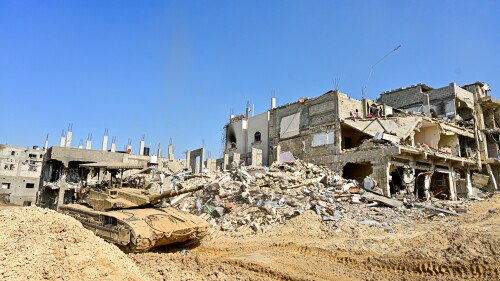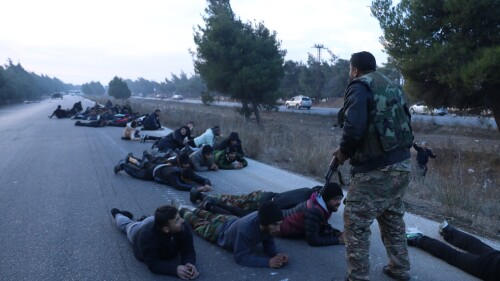The international conference that convened this week in the Swiss town of Montreux in an attempt to find a way toward resolving the war in Syria is one of the more strange international gatherings of recent years.
The aims of the combatant sides in Syria remain entirely irreconcilable.
Neither the Assad regime nor the rebellion against it is strong enough to strike a decisive blow against its opponent.
Neither side is sufficiently weak to feel compelled to accept whatever outcome its enemy wishes to impose on it.
In such a situation, diplomacy becomes reduced to the rituals of protocol.
Form replaces content. And the purpose of bringing the sides together becomes unclear.
This conference has all the familiar paraphernalia of an important diplomatic event. Foreign ministers are gathered. Speeches will be delivered. An atmosphere of grave seriousness will prevail. But the basis for substantive progress appears entirely absent.
U.S. Secretary of State John Kerry and Russian Foreign Minister Sergey Lavrov shake hands with United Nations Secretary-General Ban Ki-moon on January 21, 2014, in Montreux, Switzerland, before the start of talks focused on reaching a negotiated political settlement in Syria. (Image source: U.S. State Department) |
Conceived over a year ago, the conference is intended to set in motion the implementation of the ‘Geneva Communique’ of June 30, 2012. In its key passage, this document calls for the ‘establishment of a transitional governing body with full executive powers that could include members of the government and opposition, and should be formed on the basis of mutual consent.’
The Syrian dictator, whose foreign minister Walid Mouallem is present at the conference, has made clear that he does not accept this goal if it means that he should step down.
As regime information minister Omran al-Zoabi expressed it succinctly on the first day of the conference: ‘Assad isn’t going.’
Assad himself told Russian MPs at a meeting in Damascus earlier this month that his departure would not be under discussion at the conference. “If we had wanted to surrender, we would have surrendered from the very start. We stand at the guard of our motherland,’ the dictator informed his guests. ‘This issue lies beyond the sphere of discussion.’
Assad has made clear that as far as he is concerned, the main subject that will lie within the sphere of discussion in Geneva will be his ‘war on ‘terrorism.’ His message is that the regime is locked in combat with the same Sunni jihadi enemies that threaten the west.
From Assad’s point of view, such a stance makes perfect sense.
He is in no danger of imminent defeat. The war in Syria has been at a bloody stalemate for about a year now. The regime controls the capital, Damascus and a contiguous land area stretching up to the Mediterranean cost in the west. Assad also still maintains his grip on the main cities of the country, with the exception of Raqqa in the east (controlled by the al-Qaeda affiliated ISIS group) and Aleppo, which is divided between the government and the rebels. Assad’s allies, Iran and Russia, appear to still be standing firmly behind him. He has no incentive for compromise.
As for the rebels, they have similarly solid reasons not to submit.
They control an area of roughly equal size stretching from the border with Iraq up to the Turkish border in the north west.
Since early January, the opposition-controlled area has been engulfed in an internal civil war, with the al-Qaeda affiliated ISIS (Islamic State in Iraq and Syria) resisting attacks from the Saudi-supported fighters of the Islamic Front. This fighting made possible relatively minor gains by government forces in the northern Aleppo area.
But the rebels, too, are not facing imminent defeat. They have no shortage of men willing to engage on their behalf. Assad failed to capitalize or expand on some modest military successes in the summer. So they too see no pressing reason to compromise their core demand – that Bashar Assad cannot form part of any transitional administration.
Rebel controlled areas have borne the brunt of extraordinarily brutal tactics employed by the regime over the last three years. These have included the use of chemical weapons against civilian targets, as took place in eastern Ghouta on August 21, 2013, with the loss of 1429 lives, according to US figures. A newly released report claims that the regime has carried out the mass slaughter of 11,000 detainees.
The dictator’s uncompromising position led to a very great reluctance on the part of the opposition to take part in the conference at all. A no-show by the western financed opposition would have turned the gathering into a farce. As a result of western threats and pressure, the Syrian National Coalition eventually agreed to show up.
But this coalition in any case exerts little or no authority over the overwhelmingly Sunni Islamist fighting groups that are conducting the actual war in Syria.
They will not be there in Geneva, and will certainly not feel bound by any commitments made by the external leadership.
The Kurdish PYD, which rules the largely peaceful Kurdish enclave in the north east of the country, is also not invited.
So there are fundamental disagreements between the two sides attending the conference. On the rebel side, the most important and influential factions won’t be attending at all. The government side has no intention of conforming to the conference’s key premise (Assad’s resignation and his replacement by a transitional authority.) The opposition representatives have no intention of compromising on this demand.
The chances of such a gathering leading to any type of diplomatic breakthrough are surely close to zero.
What then is the point of all this?
The Geneva II conference is happening, it appears, for the not particularly edifying reason that the west doesn’t want to entirely ignore Syria, and can’t quite think of anything else to do.
The Geneva II conference’s main contribution to the diplomacy of the region is thus likely to be to pave the way for the Geneva III conference. And ‘all the way up to Geneva 17, before this thing’s finished,’ as one Syrian observer put it. In Syria itself, meanwhile, the bloodletting looks set to continue.
Jonathan Spyer is a senior research fellow at the Global Research in International Affairs (GLORIA) Center, and a fellow at the Middle East Forum.








